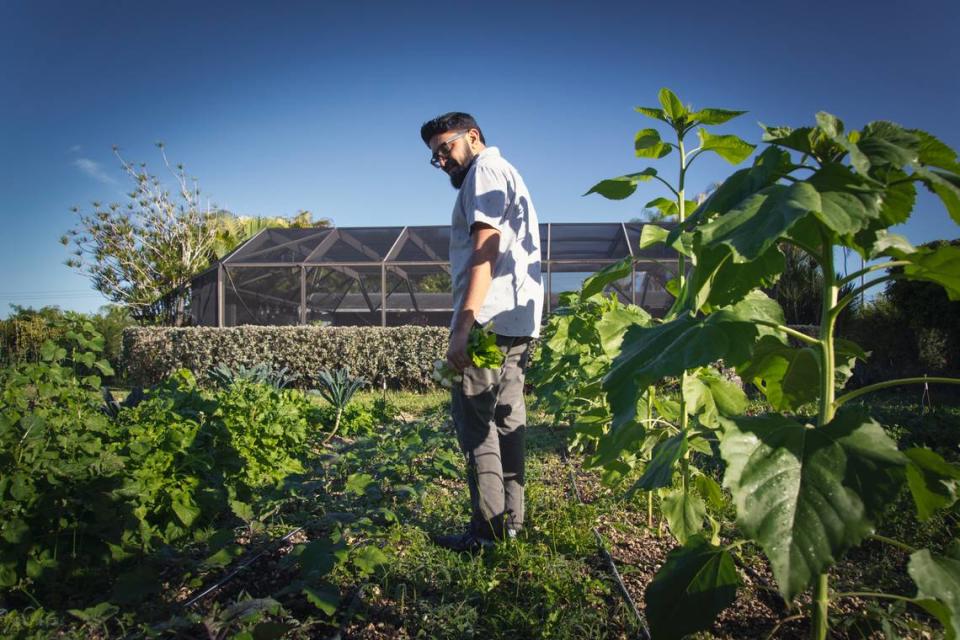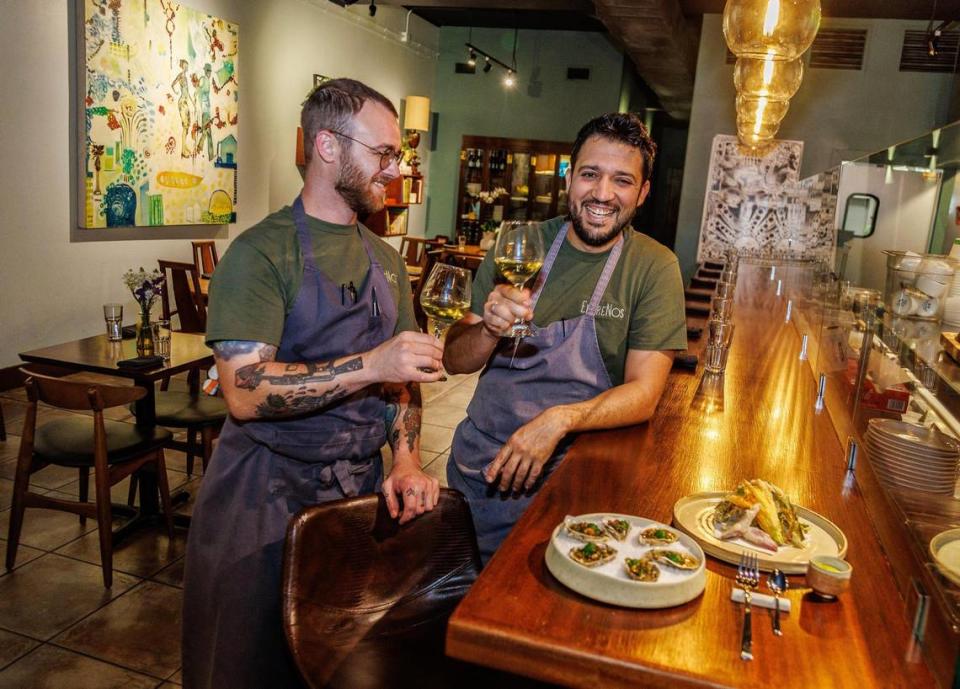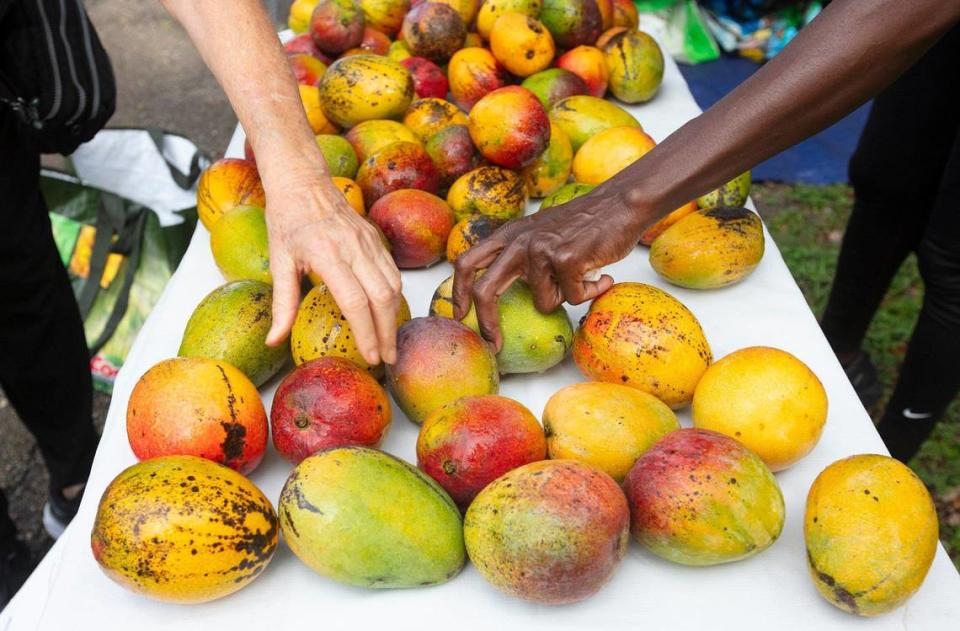Are your trees bare, too? Why Miami’s mango season is kind of a bust this year
If you have been staring at your mango tree this summer, willing the fruit to life but ultimately dejected by the stubbornly barren branches, you are not alone. This uniquely Miami drama is playing out from Homestead to Hialeah for commercial farmers, backyard gardeners, worried chefs and other tropical fruit lovers across South Florida.
It’s not your imagination. For Miami, it’s a bad mango season.
This is not to say there are no mangoes to be found. Your trees might bear some fruit, depending on where you live. Some neighborhoods are blessed; others remain bereaved.
And overall, the outlook is significantly bleaker than it was in 2023.
Chef Niven Patel of Ghee Indian Kitchen in Kendall and Erba Italian restaurant in Coral Gables has definitely noticed the shortage. The mango trees on his Homestead farm usually provide enough fruit for the whole year, up to 1,000 pounds. This year, he notes, “there were about 10 mangoes on the trees.”

“With mangoes, we used to have so many,” he said. “Last year, farmers were calling me because they had an abundance. All my neighbors, too. This year, they’re really hard for us to get. It’s nowhere close to last year. It feels like for the last four or five years it’s been hit or miss.”
Patel’s not the only chef to feel the absence. Recently Valerie Chang, who just won a James Beard Award for her Midtown restaurant Maty’s, greeted a guest with the gift of a perfect Florida mango.
“Enjoy this,” she said. “They’re hard to come by right now.”
Chef Evan Burgess of EntreNos in Miami Shores, which earned a Michelin star earlier this year, is well aware of the shortage, too. The restaurant, which he runs with business partner Osmel Gonzalez, aims to source more than 80 percent of its dishes from Florida. One ingredient they use frequently are tiny green mangoes they turn into “mango olives.”
This year, that has been a chore.
“The small ones are falling off the trees,” Burgess says. “They’re just hard to come by now, and it’s difficult to plan. Luckily we’ve had some guests who reached out and told us, ‘Bring a mango stick and come to our backyard.’ ”

Even the nonprofit Urban Oasis Project, which runs farmers markets at Legion Park and Vizcaya in Miami, has noticed a drop off and is surviving on the kindness of strangers who donate fruit. Art Friedrich, president of the group, which also plants gardens with low-income families, said whether you have fruit depends on where you are.
“You really see the microclimates in different areas,” he said. “Some neighborhoods are wiped out. Some seem to be doing fine. Some of the hardest hit areas are the big growers and agriculture areas like the Redlands. A lot of other tropical fruits are doing well. We had a great lychee season. We were selling them like crazy. Dragon fruit, jackfruit, starfruit — they’re all doing fine. Just the mango crops have taken a hit.”
So why is the 2024 season such a bust? Experts point to a couple of reasons. Dr. Jonathan Crane, a tropical fruit crop specialist with the University of Florida, said this season is “significantly down” and points to the weather as a big factor.
“We had temperatures in the 40s and 50s repeatedly and for a number of days in January, February and March,” Crane says. “That’s the blooming period. What can happen at 55 or below is you end up chilling the embryo in the seed. When you chill it, it causes physiological damage and it doesn’t set, and you don’t get fruit.”

Wind — which South Florida had a great deal of this spring — also plays a role.
“When it’s windy, say gusts greater than 20 miles an hour, that can knock off the flowers and the small fruit,” Crane says. “Branches are banging into each other, knocking flowers and fruit off.”
Low humidity can also be an issue, drying out the stigma in the female reproductive system of the flower, he explained. The pollen might be deposited but becomes too dry to stick to the surface.
Charles LaPladd, agriculture manager for Miami-Dade County, offers another possible explanation: Trees often take a year off after an abundant season.
“It’s not completely unusual to have fluctuating years,” he says. “I’ve seen mangoes take a year off in the past after tropical storms. And if you have dryness and wind, too, especially that hot wind we had blowing across the Glades, it creates this effect.”
Both LaPladd and Crane said it’s inaccurate to draw a line directly connecting climate change to this poor mango season and seeing a lean year after an abundant crop isn’t unusual. But the question remains: where can you find mangoes in Miami?
Friedrich says the Urban Oasis Project farmers markets will have them on Saturdays, but they’re selling out quickly. You could also check out other farmers markets around town, which often rely on smaller growers who aren’t hit as hard.

Another option rolls around in a few weeks at the annual Mango Festival at Fairchild Tropical Botanic Garden, which runs July 13 and 14 and offers chances to taste (and buy) a variety of mangoes and trees as well as enjoy a mango brunch and mango cocktail tastings.
“We always have a lot of mangoes at Fairchild because we have so many trees,” said Carl Lewis, the garden’s director. “We’re not seeing the standout year we had last year, which was extraordinary. But lots of varieties are doing well this year, and we have mangoes from Southeast Asia and Central America. We don’t have much monoculture, which means we tend to do well.”
That’s one way to increase your chances of mangoes in the future, he adds: Try planting trees of different varieties as insurance policies.
LaPladd has another piece of advice for mango tree owners this summer: Prune, prune, prune.
“If your blooms fell off, that tree needs to be prepared for next year,” he said.

Fairchild Tropical Botanic Garden Mango Festival
Where: 10901 Old Cutler Road, Coral Gables
When: 10 a.m.-5 p.m. July 13-14
Cost: $24.95 adults; $17.95 kids 6-17; free kids 5 and under. Individual events may have separate costs
Tickets and more information: fairchildgarden.org

